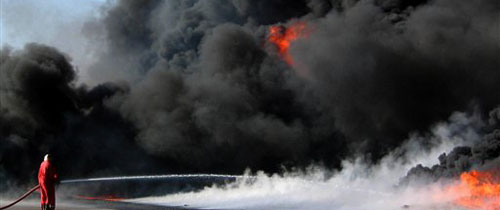No Blood for No Oil




None of the mainstream press coverage of record-high crude oil prices that I saw last week turned $92.22-a-barrel into a teachable moment. The best I came across was a pair of experts on PBS' News Hour explaining, like a Certs ad, that It's Two! Two! Two Crises in One! -- political (Bush's World War III crack, and Cheney's saber-rattling at Iran), and market (trust those futures traders to find the green amid the gloom).
But while the networks used precious airtime to show troubled drivers at gas pumps and rattled New Englanders getting their first delivery of winter heating oil, I didn't see any stories that clicked the minus-button on GoogleMaps enough times to display the big picture that actually explains this miserable moment.
A useful news story would have included Alan Greenspan acknowledging "what everyone knows: the Iraq war is largely about oil." A helpful account would have cited Gen. John Abizaid, the former CENTCOM Commander, explaining that "of course" the Iraq war is "about oil." Journalism that cares as much about sobering context as it does about B-roll bs would have reminded us that Halliburton's Dick "Secret Energy Task Force" Cheney dissed conservation as a panty-waist "personal virtue" a few months after he was sworn in as Regent. Instead of exhuming archival footage of gas station lines from the '70s, producers might have re-aired the more recent tape of former Harken Energy director George W. Bush strolling hand-in-hand through the Crawford bluebonnets with Saudi Crown Prince Abdullah, just in case anyone was wondering about the durability of the generations-long House of Bush-House of Saud alliance. And speaking of His Highness, perhaps it also would have been useful to see the There He Goes! Here He Comes! Andrews Air Force Base shots of Cheney's 14-hours-each-way flight to see King Abdullah for eight hours in Riyadh, a no-press-corps/no-press-conference trip just after Thanksgiving last year which surely had nothing to do with oil, ya think? And as long as we're connecting the dots, it wouldn't have hurt if some reporter with a decent magaphone had reviewed the number of times that Republicans in Congress and the White House have fought against windfall profits taxes and for juicy new tax breaks for ExxonMobil.
But I did come across two exceptionally useful acts of journalism online.
One -- thanks to a link from the invaluable Dan Froomkin -- was a piece by Peter K. Ashton on NiemanWatchdog.org, demonstrating that the tightness in oil inventories (which freemarketeers invoke to 'splain the spike in oil prices whenever Cheney growls) isn't some Natural Law we have to just live with, but rather the result of a conscious policy by oil companies to suppress supply, reap unprecedented profits, and miserably fail, by the way, to reinvest those bazillions into increased refining capacity.
The other is by Jack Miles, the Pultizer Prize-winning author of God: A Biography, who wrote a tremendously illuminating and deeply depressing piece on TomDispatch.com called "Endgame for Iraq Oil?" The Great Game that Bush and Cheney have really been playing all along in Iraq -- making war not for WMDs, or for Regime Change, or for Freedom Dominoes, or for Israel, but rather for "access to the world's third-largest proven oil reserves, 200 to 300 million barrels of light crude worth as much as $30 trillion" -- may soon be lost. If the Iraqi government makes good on its intention, by December 31, 2008, as stated by Foreign Minister Hoshyar Zebari, to replace the existing UN Security Council multinational security force mandate with a conventional bilateral security agreement with the US, then "the oil game will be up." With no multinational mandate, Iraq -- or its parts -- will be free to cut oil exploration deals with anyone it wants. Why, for example, wouldn't "a new, Iran-allied, oil-rich, nine-province Shiite Iraq" cut a deal "with ready-and-willing China? Will any combination of American military and diplomatic pressure suffice to stop such an untoward outcome?"
So the ultimate irony in Iraq, on top of the ultimate tragedy in Iraq, may turn out to be, as Jack Miles puts it, this: "Blood for oil may never have been a good deal, but so much blood for no oil at all may seem a far worse one."






























Posted October 28, 2007 | 11:25 AM (EST)